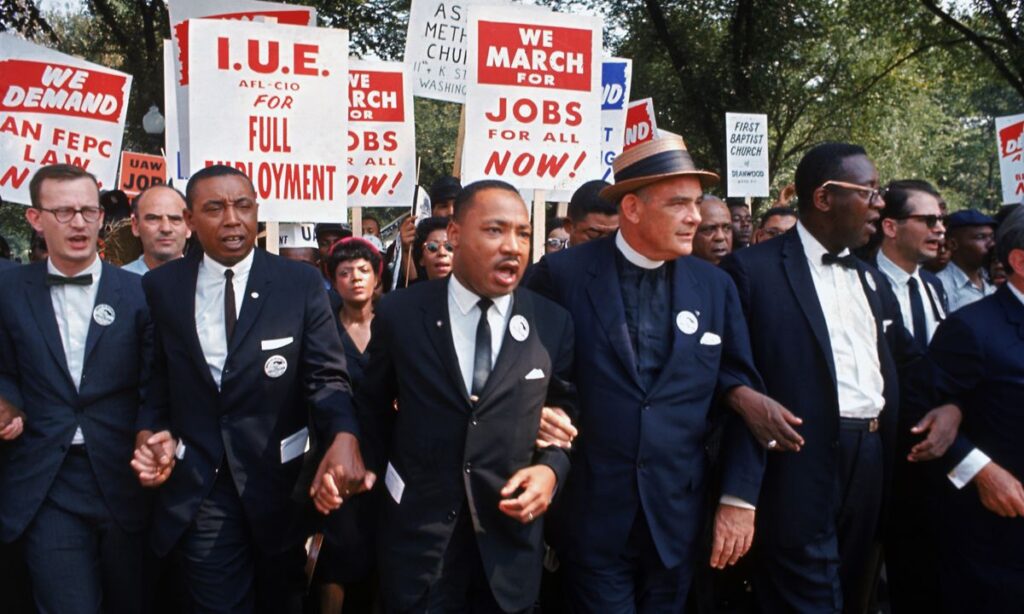Next Monday is Martin Luther King Jr. Day — a federal holiday in the US honoring the legacy of one of the most influential leaders in American history.
Martin Luther King Jr. is remembered for his pivotal role in the Civil Rights Movement. He organized efforts to dismantle racial segregation and promote social justice. His leadership in events like the Montgomery Bus Boycott and the March on Washington, where he delivered his iconic “I Have a Dream” speech, inspired millions and helped reshape the nation.
King is known for being an advocate of nonviolence; however, he made it clear that nonviolence was very different from non-resistance. King was a fierce and tireless fighter for peace and the equality of all people.
King’s dedication to achieving justice through peaceful means earned him the Nobel Prize in 1964. Today, more than 60 years after his assassination, he continues to remind us of the importance of fighting for freedom and human dignity, cementing his place as a symbol of hope and progress in American history.

To commemorate Dr. King’s legacy, we’ve put together a collection of quotes from the man himself, along with an explanation to help explain them in more detail:
“Injustice anywhere is a threat to justice everywhere.”
One of Dr. King’s best-known quotes, this emphasizes how interconnected our society is when it comes to fairness and equality.
What Dr. King is saying is that, if unfairness or injustice exists in one place, it weakens justice everywhere. For example, if people look the other way when someone is treated unfairly because of their race, religion, or background, it creates a world where injustice can grow and spread. This idea reminds us that we all have a responsibility to stand up for what’s right, not just for ourselves but for everyone.
Justice is not just about individual situations. It’s about creating a better, fairer world for everyone, no matter where they are.
“Faith is taking the first step even when you can’t see the whole staircase.”
Dr. King is teaching us about trust and courage in facing the unknown. It’s about believing in yourself and your goals even when the path ahead isn’t fully clear. For example, when you start a new project, join a sports team, or consider a career you’re passionate about, you often don’t know exactly how things will turn out. Dr. King is encouraging us to take that first step and trust that the next steps will become clearer as we move forward.
This quote reminds us that progress begins with action, and we don’t need to have all the answers to start working toward something meaningful. It’s about staying hopeful and determined even in uncertain times.
“Our lives begin to end the day we become silent about things that matter.”
This powerful quote emphasizes the importance of standing up for what is right and expressing your beliefs, even when it’s difficult. It teaches us that staying silent in the face of injustice, inequality, or any issue that truly matters allows those problems to continue unchecked.
Dr. King is reminding us that our voice is one of the most important tools we have to create change. By choosing to stay silent, we risk losing a part of what makes us truly alive: our courage, compassion, and commitment to doing what’s right. Even small actions and words can make a big difference in shaping the world around us.
“We must come to see that the end we seek is a society at peace with itself, a society that can live with its conscience.”
This speaks to the idea of building a society where justice, fairness, and compassion guide how people treat each other. Dr. King is suggesting that true peace is not just the absence of conflict but also the presence of harmony and moral integrity.
A society that can live with its conscience is one where people make decisions based on what is right and just, rather than ignoring the suffering or injustice faced by others. This serves as a reminder that the choices we make every day, big or small, contribute to the kind of community and world we create. It challenges all of us to act with kindness, courage, and a sense of responsibility toward others.
“A genuine leader is not a searcher for consensus but a molder of consensus.”
A great leader does not passively look for approval or try to follow the opinions of others. Instead, they actively shape and guide discussions, bringing people together toward a common goal.
A genuine leader has the courage to step forward with their vision, even when it may be challenging or unpopular at first. They inspire others by sharing ideas, values, and commitments that help unify people.
Leadership isn’t about following the crowd; it’s about standing firm in what you believe and helping others see the path forward. True leaders build consensus by earning trust and respect, not by waiting for everyone to agree.
“No one really knows why they are alive until they know what they’d die for.”
Everyone needs to find a purpose or cause that gives their life true meaning. Here, Dr. King challenges us to reflect on what we deeply value, and the things we care about so much that we would be willing to make sacrifices for them.
This might be about discovering passions, standing up for justice, protecting loved ones, or committing to making a positive difference in the world. King encourages us to think beyond ourselves, to live with conviction and purpose, and to align our actions with the values that we hold most dear.
When we understand what matters most to us, we find clarity in our lives and become more willing to fight for what is right, even in the face of challenges. This is how we discover not just who we are, but why we are here.
“Those who are not looking for happiness are the most likely to find it, because those who are searching forget that the surest way to be happy is to seek happiness for others.”
At first, it might seem strange to hear that not searching for happiness can lead to finding it. But, King’s words remind us that joy often comes as a result of our actions for others, not just ourselves.
When we focus too much on our own desires or what we think will make us happy, we might overlook the deeper fulfillment that comes from helping someone else. Dr. King encourages looking beyond immediate wants and thinking about how to make a difference in the lives of friends, family, or even classmates. It’s through these connections that real happiness emerges.
“We must live together as brothers or perish together as fools.”
This powerful statement addresses the importance of unity and cooperation among people. Essentially, Dr. King is reminding us that all humans are connected, and if we do not learn to respect and support one another, the consequences could be severe.
This message can also apply to everyday life; working together as a team, being inclusive and kind, and resolving conflicts peacefully. Without these efforts, disagreements or divisions could lead to unnecessary struggles that hold everyone back. Dr. King’s words emphasize that success and peace come when people put aside their differences and focus on treating each other with fairness and compassion.
“Science investigates; religion interprets. Science gives man knowledge, which is power; religion gives man wisdom, which is control. Science deals mainly with facts; religion deals mainly with values. The two are not rivals.”
Science and religion are often presenting as opposing forces. But, Dr. King uses this quote to highlight the complementary roles that science and religion can play in our lives.
Science, he explains, focuses on uncovering facts about the world around us, giving people tools and knowledge to achieve incredible things. For instance, science has led to technological advancements and discoveries that have empowered humanity to solve problems and improve our quality of life. On the other hand, religion provides guidance on values, morality, and the wisdom needed to use power responsibly. While facts can tell us what is possible, values help us decide what is right.
Through this quote, Dr. King reminds us that science and religion do not need to compete with each other; instead, they can work together to help us understand both the world we live in and how to live within it. His message encourages us to respect both the pursuit of knowledge and the pursuit of meaning, as they are both vital to building a better world.
“We must develop and maintain the capacity to forgive. He who is devoid of the power to forgive is devoid of the power to love. There is some good in the worst of us and some evil in the best of us. When we discover this, we are less prone to hate our enemies.”
Here, Dr. King speaks to the profound connection between forgiveness and the complexity of human nature. He emphasizes that forgiveness is not just an act of kindness, but a necessary strength that allows us to truly love others.
The quote suggests that no one is entirely good or entirely bad; everyone has flaws as well as virtues. Recognizing this truth can help us approach others with empathy instead of hatred. Dr. King urges us to forgive even those who wrong us, as hatred only fuels division and animosity.
Practicing forgiveness and acknowledging the humanity in others not only helps to build stronger relationships, but also fosters a sense of peace within ourselves. Through this, Dr. King shows that forgiveness is a powerful way to overcome conflict and create a more compassionate world.
